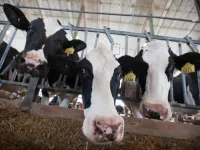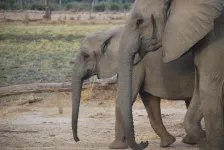(Press-News.org) Who can forget the stomach-churning moments when “Survivor” contestants forced down crunchy insects, among other unappetizing edibles, for a chance to win $1 million? In daring culinary challenges, the TV show’s contestants exhibited gastronomic bravery as viewers watched in discomfort.
Digesting a crunchy critter starts with the audible grinding of its rigid protective covering — the exoskeleton. Unpalatable as it may sound, the hard cover might be good for the metabolism, according to a new study, in mice, from Washington University School of Medicine in St. Louis.
The researchers, led by Steven Van Dyken, PhD, an assistant professor of pathology & immunology, found in mice that digesting chitin, an abundant dietary fiber in insect exoskeletons and also mushrooms and crustacean shells, engages the immune system. An active immune response was linked to less weight gain, reduced body fat and a resistance to obesity.
“Obesity is an epidemic,” Van Dyken said. “What we put into our bodies has a profound effect on our physiology and on how we metabolize food. We're investigating ways to counteract obesity based on what we learn about how the immune system is engaged by diet.”
The study is published Sept. 7 in Science.
The immune system is well known for safeguarding the body against various threats, including bacteria, viruses, allergens and even cancer. The researchers found that a particular arm of the immune system also is involved in chitin digestion. Stomach distention after chitin ingestion activates an innate immune response that triggers stomach cells to ramp up production of enzymes, known as chitinases, that break down chitin. Of note, chitin is insoluble — incapable of being dissolved in liquid — and thus requires enzymes and harsh acidic conditions to digest.
Do-Hyun Kim, PhD, a postdoctoral research associate and first author on the study, performed the experiments in germ-free mice lacking intestinal bacteria. His results show that chitin activates immune responses in the absence of bacteria.
“We think chitin digestion mainly relies on the host’s own chitinases,” Van Dyken said. “The stomach cells change their enzymatic output through a process we refer to as adaptation. But it is surprising that this process is happening without microbial input, because bacteria in the gastrointestinal tract are also sources of chitinases that degrade chitin.” Van Dyken noted that in mice with intestinal bacteria, dietary chitin altered the bacterial composition in the lower gastrointestinal tract, suggesting that gut bacteria also adapt to chitin-containing food after it leaves the stomach.
The research team found that the greatest impact on obesity in mice occurred when chitin activated the immune system but was not digested. Mice fed a high-fat diet also were given chitin. Some mice lacked the ability to produce chitinases to break down chitin. The mice that ate chitin but couldn’t break it down gained the least amount of weight, had the lowest body fat measurements and resisted obesity, compared with mice that didn’t eat chitin and with those that did but could break it down.
If the mice could break down chitin, they still benefited metabolically, but they adapted by overproducing chitinases to extract nutrients from chitin.
Van Dyken and his team next plan to follow up on their findings in people, with a goal of determining whether chitin could be added to human diets to help control obesity.
“We have several ways to inhibit stomach chitinases,” he said. “Pairing those approaches with a chitin-containing food might have a very real metabolic benefit.”
END
Fiber from crustaceans, insects, mushrooms promotes digestion
Findings, in mice, suggest engaging immune system with such fiber to counteract obesity
2023-09-07
ELSE PRESS RELEASES FROM THIS DATE:
They fall more easily for conspiracy theories
2023-09-07
People who primarily use their own gut feeling to determine what is true and false are more likely to believe conspiracy theories. That is the conclusion of researchers at Linköping University, Sweden, who have investigated the relationship between susceptibility to misleading information and the conviction that the truth is relative.
“I think many people who emphasise a more relativistic view of what truth is mean well. They believe that it’s important that everyone should be able to make their voice heard. But these results show that such a view can actually be quite dangerous,” says PhD student ...
Almoosa Specialist Hospital is first to be certified as a Comprehensive Chest Pain Center in the Kingdom of Saudi Arabia
2023-09-07
DALLAS and Al Mubarraz, Kingdom of Saudi Arabia, September 7, 2023 — Almoosa Specialist Hospital, in Al Ahsa, Saudi Arabia has been recognized by the American Heart Association, the world's leading nonprofit organization focused on heart and brain health for all, as a the first Comprehensive Chest Pain Center in the country. This designation signifies the hospital’s status as a critical element in the kingdom’s effort to create a system of healthcare that seeks to save lives in Saudi Arabia by closing the gaps ...
Psilocybin – a promising therapy for treatment-resistant depression?
2023-09-07
September 7, 2023 – A growing body of evidence suggests that psychedelic drugs may be useful in treating various mental health conditions. However, many challenges remain in defining their clinical benefits and overcoming the complex regulatory obstacles to their use. The September issue of Journal of Psychiatric Practice presents a research review and update on therapeutic use of psychedelics – focusing on the use of psilocybin for treatment of depression. The journal is published in ...
NASA’s Swift learns a new trick, spots a snacking black hole
2023-09-07
Using NASA’s Neil Gehrels Swift Observatory, which launched in 2004, scientists have discovered a black hole in a distant galaxy repeatedly nibbling on a Sun-like star. The object heralds a new era of Swift science made possible by a novel method for analyzing data from the satellite’s X-ray Telescope (XRT).
“Swift’s hardware, software, and the skills of its international team have enabled it to adapt to new areas of astrophysics over its lifetime,” said Phil Evans, an astrophysicist at the University of Leicester in the United Kingdom and longtime Swift team member. “Neil Gehrels, the ...
U of M study suggests hepatitis C patients should consider revaccination for hepatitis B
2023-09-07
MINNEAPOLIS/ST. PAUL (09/07/2023) — Recently published research from the University of Minnesota Medical School suggests individuals with hepatitis C should consider revaccination for hepatitis B. The study was published in the Journal of Infectious Diseases.
Previous research has shown individuals with hepatitis C infection have a lower response to the hepatitis B virus (HBV) vaccine.
“This study has broad implications for public health in hepatitis-infected individuals,” said Jose Debes, MD, PhD, an ...
NYU Tandon School of Engineering researchers develop hurricane power outage prediction model that outperforms traditional methods
2023-09-07
Utility companies are generally well-equipped to handle routine blackouts, but often struggle with extreme weather events like hurricanes.
Conventional hurricane power-outage prediction models often produce incomplete or incorrect results, hampering companies’ abilities to prepare to restore power as quickly as possible, especially in cities that are susceptible to prolonged hurricane-induced power outages.
New research from NYU Tandon School of Engineering may help solve that problem.
By combining wind speed and precipitation ...
Cattle on low-protein rations may need amino acid supplement to boost milk yield
2023-09-07
UNIVERSITY PARK, Pa. — When dairy cows are fed diets with reduced protein concentrations — aimed at decreased environmental nitrogen pollution from their manure such as nitrate leaching, nutrient-laden run-off and ammonia volatilization — their milk production can suffer. Supplementing the amino acid histidine may help in maintaining, and even increasing, milk and milk-protein yields.
That’s the conclusion of a new study conducted by an international research team led by Alexander Hristov, Penn State distinguished ...
"Monstrous births” and the making of race in the nineteenth-century United States
2023-09-07
From the Middle Ages to the Enlightenment, “monstrous births”—malformed or anomalous fetuses—were, to Western medicine, an object of superstition. In 19th-century America, they became instead an object of the “modern scientific study of monstrosity,” a field formalized by French scientist Isidore Geoffroy Saint-Hilaire. This clinical turn was positioned against the backdrop of social, political, and economic activity that codified laws governing slavery, citizenship, immigration, family, ...
Moral reasoning displays characteristic patterns in the brain
2023-09-07
(Santa Barbara, Calif.) — Every day we encounter circumstances we consider wrong: a starving child, a corrupt politician, an unfaithful partner, a fraudulent scientist. These examples highlight several moral issues, including matters of care, fairness and betrayal. But does anything unite them all?
Philosophers, psychologists and neuroscientists have passionately argued whether moral judgments share something distinctive that separates them from non-moral matters. Moral monists claim that morality is unified by a common characteristic and that all moral issues involve concerns about harm. Pluralists, in contrast, argue that moral ...
Echoes of extinctions: novel method unearths disruptions in mammal trait-environment relationships
2023-09-07
Large-bodied mammals play crucial roles in ecosystems. They create habitats, serve as prey, help plants thrive, and even influence how wildfires burn. But now, fewer than half of the large mammal species that were alive 50,000 years ago exist today, and those that remain are threatened with extinction from intensifying climate change and human activities.
While mammal extinctions are well-documented, very little research has explored the impact those losses had on the nuanced ways in which mammal communities interact with their environments. Researchers at the Georgia Institute of Technology are using a novel methodology to investigate how mammals’ ability to function in their environments ...
LAST 30 PRESS RELEASES:
Scientists identify smooth regional trends in fruit fly survival strategies
Antipathy toward snakes? Your parents likely talked you into that at an early age
Sylvester Cancer Tip Sheet for Feb. 2026
Online exposure to medical misinformation concentrated among older adults
Telehealth improves access to genetic services for adult survivors of childhood cancers
Outdated mortality benchmarks risk missing early signs of famine and delay recognizing mass starvation
Newly discovered bacterium converts carbon dioxide into chemicals using electricity
Flipping and reversing mini-proteins could improve disease treatment
Scientists reveal major hidden source of atmospheric nitrogen pollution in fragile lake basin
Biochar emerges as a powerful tool for soil carbon neutrality and climate mitigation
Tiny cell messengers show big promise for safer protein and gene delivery
AMS releases statement regarding the decision to rescind EPA’s 2009 Endangerment Finding
Parents’ alcohol and drug use influences their children’s consumption, research shows
Modular assembly of chiral nitrogen-bridged rings achieved by palladium-catalyzed diastereoselective and enantioselective cascade cyclization reactions
Promoting civic engagement
AMS Science Preview: Hurricane slowdown, school snow days
Deforestation in the Amazon raises the surface temperature by 3 °C during the dry season
Model more accurately maps the impact of frost on corn crops
How did humans develop sharp vision? Lab-grown retinas show likely answer
Sour grapes? Taste, experience of sour foods depends on individual consumer
At AAAS, professor Krystal Tsosie argues the future of science must be Indigenous-led
From the lab to the living room: Decoding Parkinson’s patients movements in the real world
Research advances in porous materials, as highlighted in the 2025 Nobel Prize in Chemistry
Sally C. Morton, executive vice president of ASU Knowledge Enterprise, presents a bold and practical framework for moving research from discovery to real-world impact
Biochemical parameters in patients with diabetic nephropathy versus individuals with diabetes alone, non-diabetic nephropathy, and healthy controls
Muscular strength and mortality in women ages 63 to 99
Adolescent and young adult requests for medication abortion through online telemedicine
Researchers want a better whiff of plant-based proteins
Pioneering a new generation of lithium battery cathode materials
A Pitt-Johnstown professor found syntax in the warbling duets of wild parrots
[Press-News.org] Fiber from crustaceans, insects, mushrooms promotes digestionFindings, in mice, suggest engaging immune system with such fiber to counteract obesity



